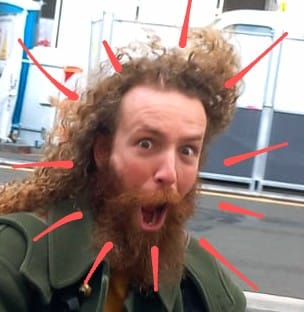I work in IT, everyone in the workplace that doesn’t work in IT is basically a child when it comes to computers, so I can explain computers to a child.
Not casting aspersions or anything, but after the 5th time you’ve taught the same 63 year old doctor how to use a mouse you start to recognize a pattern, and I’ve been doing it long enough that I have started to successfully guess and solve the problem while people are still trying to find the words to describe the problem to me.
Basic computer networking. Gonna charge you for advanced stuff.
History. Name a year and inknow something that happened there. Its my autism hyperfocus
Only reason why i didnt go down the academic path is because i am not good at writing it down to specific questions on standardised tests.
As a child and young teen I wanted to teach history so vehemently, but because i couldnt get the grades that i needed to study history i went into the job market
Sharpening and wood hand planing. They go hand and hand with another
Mechanical repair and troubleshooting.
Lefty loosey righty tighty
This worked well for me when I could see the screw and it’s orientation was the same as me viewing it. If I was turning it and it was rotated 90° away from me, I’d get it wrong. In physics class, we studied electromagnetic forces and I learned about the right hand rule which for some odd reason works better for me than righy-tighty. The Wikipedia article is long and the TL;DR is that if you use your right hand and turn in the direction of your fingers, the screw will move in the direction of your thumb.
Of course lefties are SOL as are folks without thumbs.
I’m not from an English-speaking country and I still use this every time I pick up a screwdriver.
For know which is left and right I switch to my own language to say “right says Hi, left says Bye” with a mental or physical mime of shaking someone hand and then waving goodbye with the other. It originally has alliteration, but kinda works translated as well.
I have two obscure knowledge bases; botany and wastewater treatment. I can and have taught both to children.
What would you say are some of the core principals of both that you would teach to children?
Wastewater - Separating liquids, solids, and gases for responsible re-use.
Botany - Learning about the natural world and how it relates to everything you know and love (i.e. without plants there would be no humans, chocolate is yummy, grasses feed the world, etc).
Flushable wipes are not in fact flushable.
Electricity. I’m a field electrician studying the engineering side.
Electricity is all about guiding voltage and current in a preferred direction as to do some form of work, whether it’s producing light, turning a motor, or integrating into logic circuits to make your computer do tricks.
To keep yourself in the clear, don’t touch the shiny bits.
Ok can I test your ability to explain it to a child? Why are phone batteries measured in mAh but car batteries are measured in kWh?
I have a PhD in mathematics (set theory). It would be pretty tough to explain to a child. Specifically my PhD is in determinacy, which is way easier to explain than most branches of set theory, but you do need a decent understanding of infinity to really get anywhere.
Let’s assume I can prove the countability and non countability of various famous sets and, for example, that (ab)c = a^bc for cardinalities. What’s determinacy?
As a field of study, it’s the study of two-player games of perfect information (so think chess, not football or poker) in which each player may make countably many moves (you can also look at uncountable-length games but it’s not common). I’ll give you more detail than I would a child :P
Each player takes turns to move. You can encode the moves they make as coming from some set - for example they might just play numbers. The rules of the game are imposed by a winning set, which is a set of countable-length sequences of moves, and we say that player I wins if the infinite sequence of her first move followed by player II’s first move followed by her second move, etc, is in the winning set. Otherwise player II wins. (There are no draws, which technically means chess falls outside the scope of this setup, but it turns out not to be a big deal)
(This allows you to encode what moves are allowed by the rules - you just say that any sequence which contains a move where that player broke a rule is a loss for that player, regardless of what comes afterwards.)
Each winning set defines a different game. The property of determinacy is a property of sets of infinite sequences which says that there is a winning strategy for either player. A strategy is just a function which takes the finite sequence of moves up to that point in the game and tells the player (the player for whom the strategy is) what to do. A winning strategy is one which, if followed, always results in a win for that player.
If we modify the rules of noughts and crosses (tic-tac-toe) so that draws are arbitrarily decided to give a win to player I, we know that this (finite) game has a winning strategy. In fact, any finite game has a winning strategy (or, if there are draws, this means there is a non-losing strategy). The outline of the proof is that if player I does not have a strategy to get to one of the (finitely many) winning states, then we can find a strategy for player II which avoids those winning states. (Remember, winning states are winning for I).
So, which games are determined? Are all games determined? Well, it’s actually easy (through a diagonalisation argument, same as proving uncountability of the reals) that not all infinite (countable-length, that is) games played with natural numbers (as moves) are determined. But you can create a way of categorising the sets of countable sequences of natural numbers (i.e. the possible winning sets) by a kind of complexity. This is the basis of descriptive set theory. It starts with topology: you can define basic open sets in this space as those sets consist of all infinite sequences which share a common finite prefix. Closed sets are the complements of open sets, as usual. But then you can define a hierarchy of complexity where the next level are countable unions of closed sets, then the next level are countable unions of complements of countable unions of complements of open sets. (An introduction to descriptive set theory will say more about this).
It’s quite easy to prove that all open sets and all closed sets in this hierarchy of complexity are determined. It’s a little harder to prove that the second level is determined, and harder still to prove that the third level is. Eventually a guy named Tony Martin (D. A. Martin) proved that all Borel sets in this hierarchy are determined. If you know your analysis, the Borel sets are exactly what you’re thinking: they’re the sets formed by all arbitrary countable unions, intersections and complements of open sets.
The interesting thing about this proof was that it needed a huge amount of set theoretic “power”. Most ordinary mathematics like analysis doesn’t need all the axioms of set theory, but this needed a massive chunk of them. This makes it interesting to set theorists because it tells us something about the relationship between something quite concrete: complexity of sets and strategies for easily-defined games on the one hand, and something quite abstract: the axioms of set theory. This pattern continues higher up: more determinacy can be proved if you assume even stronger axioms, going beyond what is typically included in set theory.
Thank you, that was very interesting. I was surprised at the definition of the basic open sets because they felt quite closed to my intuition, so the topology feels discrete to me. It’s definitely Hausdorff, I guess, but that’s no big deal. I’m guessing if you’re saying it uses a lot of the axioms, it uses the axiom of choice. It feels like that kind of arena, but I’m no set theorist. Having been taught by ring theorists, I always found the axiom of choice no big deal and totally uncontroversial, but I’m aware of the existence of mathematicians who feel otherwise, intuitionists (confusing name) and constructivists and the like. Do set theorists have a lot of debate about axioms, is it largely led by consensus, or deeply controversial, or just a case of making clear which you’re using and no one gets excited about it?
Photography and mechanical keyboards, and cooking. I am no Ansel Adams, and I don’t know every new photography technology and setting, but in terms of the fundamentals and the core principles, I can definitely teach a class, and have taught people, although not children. I haven’t taught the other two, but I could definitely expand on them for, well, hours for mechanical keyboards, and days to weeks for cooking. I’m almost certainly forgetting several topics too, but whatever, this is Lemmy.
EDIT: If anyone is rolling up in here teaching classes on residential plumbing, electrical, demolition, or contracting, hit me up. I need to my house down to the sticks, and redo all the electrical and plumbing and the floors and the walls and the insulation. I’m trying to figure out how much of this I feel like tackling myself, or is even possible of tackling myself, versus how much I am willing to pay professionals to just take care of for me. Oh, also I designed a sweet fence for an area of my backyard to keep my pets safe, so would love tips on building that too. Cheers!
Hey I got a PDF on electrical work from my online electrician course I can give you. If you’re at all mechanically inclined you’ll have it down pat by the end of the book.
Sounds great, because I am!
Check your DM my dude
Philosophy and yes, I’d say it helps at times actually.
Can you tell us a bit about the specifics of your field?
Isosynchronous low latency audio networks. And: No.
I am a pilot and flight instructor. I don’t know about a child but I’ve explained the art of airplane flying such that a teenager can understand it.
“Smart City” is a concept of a modern city, where a bunch of different things like pollution or traffic density can be put into data, collected and evaluated, so that we can have quick access to the status of a whole city.
Things to use this for: avoiding bad traffic, planning new city projects like bridges or even looking where you can save money on a city budget.
Currently there’s quite a few cities and projects who act as case studies but this is all preparation, we still need lots of science until we can make use of the full potential of this idea.
There’s lots of other computer science topics I know very well (AIs being one of them funnily enough) but even I would zone out if you didn’t bring a little attendance present and a live demonstration when I need to listen to you explain it.
Airplanes. granddad was an aeronautical engineer and was always eager to tell me everything about em
“Digital humanities” is making computers help us understand our history and how we live together, as groups, as societies of people.









